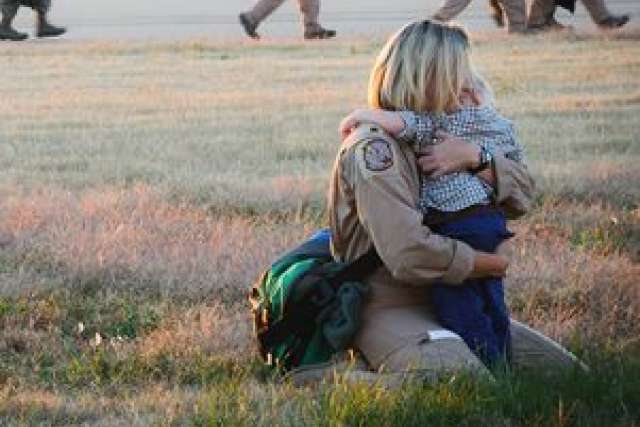While the majority of service members and families successfully cope with these challenges through family and community support, other families face challenges that can include divorce, child abuse and even suicide.
Now the UCLA/Duke University National Center for Child Traumatic Stress (NCCTS), under a new agreement with the United States Department of Defense, will train behavioral health specialists who work on military bases to provide assistance for military families impacted by child abuse, domestic violence and other forms of child traumatic stress.
Specifically, the NCCTS will develop a web-based system to provide training to some 2,000 specialists to acquire the knowledge and experience to effectively address child abuse when it occurs.
The center is at the forefront of modernizing interventions for the children who have been exposed to family and community violence, disasters and also refugees from war-torn countries. Since 2001, the UCLA/Duke University National Center for Child Traumatic Stress has been committed to building the National Child Traumatic Stress Network (NCTSN). Supported by the Substance Abuse Mental Health Administration under the Department of Health and Human Services, the network has always provided support to military and veteran families negatively affected by deployment, combat injury or family difficulties during reintegration of the military member back into society.
“The NCTSN already has in place programs to assist traumatized children and their families. Now, we are modifying these trauma-informed, evidence-based practices for behavioral health specialists to treat military children,” said Gregory Leskin, director of the Military and Veteran Families Program at the center.
The new program will use a web-based approach to train a worldwide cadre of providers. Those who participate in the program will also have opportunities to form online communities with their colleagues to enhance their abilities by sharing best practices and lessons learned from their collective experiences.
One virtual program, for example, has been developed to deliver clinical training on child traumatic stress to U.S. military behavioral health providers. From their office computers, said Leskin, these providers will be trained remotely by some of the world’s leading experts in evidence-based treatments for child traumatic stress. Further, he said, “This unique configuration of learning and social networking will allow these staff to connect to each other to discuss their progress reaching their learning goals. As a result, a military behavioral staff member working in Hawaii will have access to the same on-demand training materials as their colleagues staffing clinics in Europe.”
Said Dr. Robert Pynoos, co-director for the UCLA/Duke University program: “Having a web-based training system puts the NCTSN in a unique position to assist the Department of Defense to modernize the care of children and families. We are honored to work with the military community and the family advocacy program to provide this training to military providers.”
In addition to working with the Department of Defense, the National Center for Child Traumatic Stress Military and Veterans Program currently provides training to more than 60 top clinical programs nationally, providing treatments to military and veteran families as part of a community-wide initiative to support behavioral health. The network partners with many national military and non-profit groups to address the mental health needs of military children and youth who might be affected by their parent’s or family member’s deployment.
The UCLA/Duke University NCCTS would like to acknowledge the UCLA Irene Fund for Mental Health, which has provided long-standing support of clinical services in mental health care for traumatized children, adolescents, and their families at UCLA. The NCCTS is part of the The Semel Institute for Neuroscience and Human Behavior, an interdisciplinary research and education institute devoted to the understanding of complex human behavior, including the genetic, biological, behavioral and sociocultural underpinnings of normal behavior, and the causes and consequences of neuropsychiatric disorders. In addition to conducting fundamental research, the institute faculty seeks to develop effective strategies for prevention and treatment of neurological, psychiatric and behavioral disorder, including improvement in access to mental health services and the shaping of national health policy.



